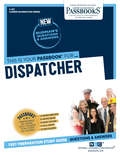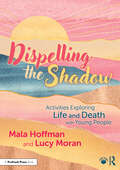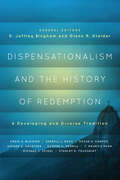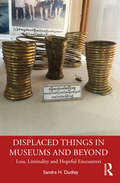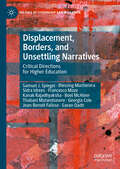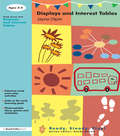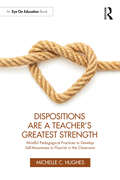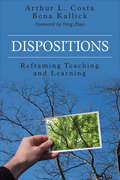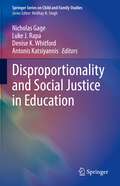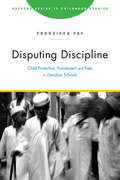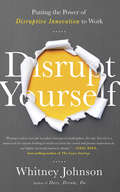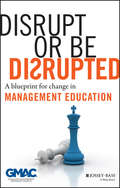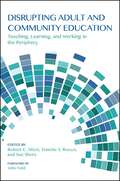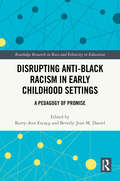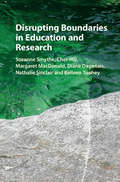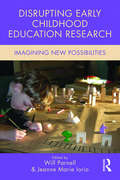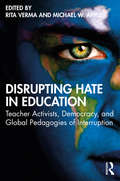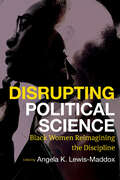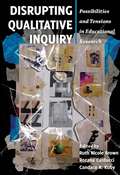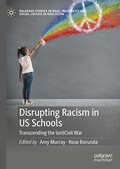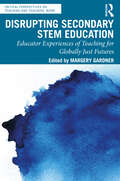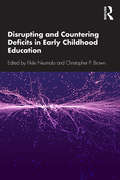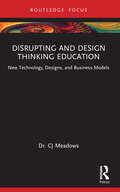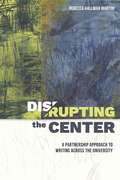- Table View
- List View
Dispatcher: Passbooks Study Guide (Career Examination Series #C-294)
by National Learning CorporationThe Dispatcher Passbook® prepares you for your test by allowing you to take practice exams in the subjects you need to study. It provides hundreds of questions and answers in the areas that will likely be covered on your upcoming exam, including but not limited to: coding/decoding information; following directions and maps; procedures related to emergency calls and situations; name and number checking; understanding and interpreting written material; and more.
Dispelling the Shadow: Activities Exploring Life and Death with Young People
by Mala Hoffman Lucy MoranDispelling the Shadow provides a context for navigating through the challenges and emotions that children may experience when discussing the cycle of life.Using a curriculum framework adaptable to many different settings and purposes, this book contains discussion prompts, activities and resources grounded in science, folklore, belief systems and creative expression to allow young people at varying age levels to begin to confront death and grief with compassion and curiosity. Each section covers a different age level and contains overarching themes and activities designed to inspire thoughtful conversation between adult and child. Each chapter includes downloadable expanded activities and additional age-appropriate readings to continue the conversation as needed.With its comprehensive view of universal themes and immediately implementable practical advice, this book is an essential tool for parents, social workers, educators, librarians and child advocates to give young people perspective and hope for the future.
Dispensationalism and the History of Redemption: A Developing and Diverse Tradition
by D. Jeffrey Bingham and Glenn R. KriederTop-level scholarship on an enduring traditionDispensationalism has long been associated with a careful, trustworthy interpretation of Scripture. Reflective of its past and present status and strategic to its future, Dispensationalism and the History of Redemption is a fresh defense of a time-tested tradition.Made up of ten essays from leading dispensationalist scholars, this volume covers the critical elements to know:An introduction to dispensationalism—including its terms and biblical supportThe history and influence of dispensationalism—from its roots in John Nelson Darby to its global reach through missionsThe hermeneutic of dispensationalism—the interpretive principles behind the systemDispensationalism and redemptive history—the story of salvation traced through the Old and New Testaments, including their unity and diversity in relation to ChristDispensationalism and covenant theology—a comparison and contrast between two main evangelical perspectives on Scripture&’s unityWith contributors from top-tier schools like Dallas Theological Seminary and Wheaton College, Dispensationalism and the History of Redemption is an expert treatment of an enduring yet developing tradition.
Dispensationalism and the History of Redemption: A Developing and Diverse Tradition
by D. Jeffrey Bingham and Glenn R. KriederTop-level scholarship on an enduring traditionDispensationalism has long been associated with a careful, trustworthy interpretation of Scripture. Reflective of its past and present status and strategic to its future, Dispensationalism and the History of Redemption is a fresh defense of a time-tested tradition.Made up of ten essays from leading dispensationalist scholars, this volume covers the critical elements to know:An introduction to dispensationalism—including its terms and biblical supportThe history and influence of dispensationalism—from its roots in John Nelson Darby to its global reach through missionsThe hermeneutic of dispensationalism—the interpretive principles behind the systemDispensationalism and redemptive history—the story of salvation traced through the Old and New Testaments, including their unity and diversity in relation to ChristDispensationalism and covenant theology—a comparison and contrast between two main evangelical perspectives on Scripture&’s unityWith contributors from top-tier schools like Dallas Theological Seminary and Wheaton College, Dispensationalism and the History of Redemption is an expert treatment of an enduring yet developing tradition.
Displaced Things in Museums and Beyond: Loss, Liminality and Hopeful Encounters
by Sandra H. DudleyDisplaced Things in Museums and Beyond looks anew at the lives, effects and possibilities of things. Starting from the perspectives of things themselves, it outlines a particular, displacement approach to the museum, anthropology and material culture. The book explores the ways in which the objects are experienced in their present, displaced settings, and the implications and potentialities they carry. It offers insights into matters of difference and the hope that may be offered by transformative encounters between persons and things. Drawing on anthropological studies of ritual to conceptualise and examine displacement and its implications and possibilities, Dudley develops her arguments through exploration of displaced objects now in museums and dislocated or exiled from their prior geographical, historical, cultural, intellectual and personal contexts. The book’s approach and conclusions are relevant far beyond the museum, showing that even in the most difficult of circumstances there is agency, distinction and dignity in the choices and impacts that are made, and that things and places as well as people have efficacy and potency in those choices. In Displaced Things, displacement emerges as fundamental to understanding the lives of things and their relationships with human beings, and the places, however defined, that they make and pass within. The book will be essential reading for academics and students engaged in the study of museums, heritage, anthropology, culture and history.
Displacement, Borders, and Unsettling Narratives: Critical Directions for Higher Education (Politics of Citizenship and Migration)
by Samuel J. Spiegel Blessing Mucherera Sidra Idrees Francesco Moze Kanak Rajadhyaksha Boel McAteer Thabani Mutambasere Georgia Cole Jean-Benoit Falisse Savan QadirThis short book discusses some of the urgent critical debates regarding intercultural education on displacement during turbulent times of contentious border politics and ramped-up anti-migrant discourse. Drawing on original research and teaching insights from a team of co-authors from Pakistan, Iraq, Zimbabwe, Italy, India, Canada, the UK and beyond who are involved in teaching students from more than two dozen countries, it focuses on experiences of teaching in the midst of controversial refugee detention and deportation schemes – just some of many developments in the United Kingdom condemned strongly by several United Nations agencies. The authors’ analysis engages reflections, from diverse backgrounds and positionalities, on approaches to education that seek to deepen understandings of displacement experiences in an interconnected world as well as geopolitical responses, methodologies and representational practices.
Displays and Interest Tables (Ready, Steady, Play!)
by Jayne OlpinConveying how collections and displays can become the focus for much discussion and debate in circle time, and how they can be linked to other play areas and themes running throughout the nursery, Displays and Interest Tables helps you to: demonstrate the value of young children's efforts stimulate learning through two-and three-dimensional displays create exciting visual features for your setting.
Dispositions Are a Teacher's Greatest Strength: Mindful Pedagogical Practices to Develop Self-Awareness to Flourish in the Classroom
by Michelle C. HughesDispositions Are a Teacher’s Greatest Strength will fuel and reignite your classroom practice. Focusing on 13 dispositions specific to teaching, this book encourages educators to identify, reflect, and develop their dispositions, attitudes, and self-awareness to flourish in the profession. Emphasizing pedagogical knowledge and skills, this text serves as an affirmation of a teacher’s commitment to challenging, complex and rewarding work. It invites educators to consider what a unique privilege it is to teach—to dive into reading, creating space, and embracing dispositions as a teacher’s greatest strength. Each chapter focuses on one of 13 teaching dispositions—such as curiosity, adaptability, gratitude, resilience, and courage—and offers: definitions and contexts for the disposition of focus; concrete applications for teachers to practice and develop dispositions with reader-friendly examples and practical strategies; a “pause and reflect” section with questions and space for professional reflection. This book serves as a love letter to educators everywhere: teachers in K-12, administrators in K-12, higher education faculty, and pre-service programs and students. Dispositions Are a Teacher’s Greatest Strength reminds teachers of the significant work they do by putting dispositions at the forefront of their daily work.
Dispositions: Reframing Teaching and Learning
by Arthur L. Costa Bena KallickFrom the authors of the best-selling Habits of Mind… Two leading consultants present a game-changing look at why and how to “mind the gap” between what we claim are educational essentials, and how we evaluate results. Dispositions builds on the authors’ influential Habits of Mind writings, including new evidence of why influencing students’ dispositional habits is their key to finding meaning in classroom content. Topics include: Making dispositions come alive in the minds of students Shifting the thinking of educational leaders, parents, politicians and the public How to align day-to-day classroom practices with larger dispositional outcomes
Disproportionality and Social Justice in Education (Springer Series on Child and Family Studies)
by Nicholas Gage Luke J. Rapa Denise K. Whitford Antonis KatsiyannisThis book examines disproportionality in education, focusing on issues of social justice for diverse and marginalized students. It addresses disproportionality as an indicator of biased practices and uses social justice as the frame for conceptualizing disproportionality historically and as a means to improve educational practice. Chapters explore the historical issue of disproportionality in education; outcomes experienced by racially and ethnically diverse students and students with disabilities, including discipline, bullying, and academic achievement; and ways in which social justice can inform policy and practice to make a positive impact reducing disproportionality in education. Key areas of coverage include:Methodological and statistical concerns in disproportionality research in education.Reviews research and data on disproportionality in education (e.g., disciplinary exclusion, bullying, seclusion and restraint, corporal punishment, school-based arrests, and academic achievement).Social justice as a theoretical and legal driver for change in policy and practice.Educational assessment and intervention practices designed to address disproportionality in education. Disproportionality and Social Justice in Education is a must-have resource for researchers, professors, and graduate students as well as clinicians, practitioners, and policymakers across such disciplines as clinical child and school psychology, educational psychology and teaching and teacher education, social work and counselling, pediatrics and school nursing, educational policy and politics, public health, and all interrelated disciplines.
Disputing Discipline: Child Protection, Punishment, and Piety in Zanzibar Schools (Rutgers Series in Childhood Studies)
by Franziska FayDisputing Discipline explores how global and local children’s rights activists’ efforts within the school systems of Zanzibar to eradicate corporal punishment are changing the archipelago’s moral and political landscape. Through an equal consideration of child and adult perspectives, Fay explores what child protection means for Zanzibari children who have to negotiate their lives at the intersections of universalized and local "child protection" aspirations while growing up to be pious and responsible adults. Through a visual and participatory ethnographic approach that foregrounds young people’s voices through their poetry, photographs, and drawings, paired with in-depth Swahili language analysis, Fay shows how children’s views and experiences can transform our understanding of child protection. This book demonstrates that to improve interventions, policy makers and practitioners need to understand child protection beyond a policy sense of the term and respond to the reality of children’s lives to avoid unintentionally compromising, rather than improving, young people’s well-being.
Disrupt Yourself: Putting the Power of Disruptive Innovation to Work
by Whitney JohnsonAre you a high potential charting your course within your current organization, a leader trying to jumpstart innovative thinking in your company? Or are you ready to do something new? Consider this simple yet powerful idea: disruptive companies and ideas upend markets by doing something truly different--they see a need, an empty space waiting to be filled, and they dare to create something for which a market may not yet exist. An expert in driving innovation via personal disruption, Whitney Johnson, will help you understand how the frameworks of disruptive innovation can apply to you: if you want to be successful in unexpected ways, follow your own disruptive path. Dare to innovate. Dream big dreams. Do something astonishing. Disrupt yourself. In this book, you will learn how to apply these frameworks to building a business, career--and you. We are living in an era of accelerating disruption--those who can manage the S-curve waves of learning and maxing out will have a competitive advantage. But this is a skill set that needs to be learned. Disrupt Yourself will help people cope with the unpredictability of disruption, and use it to their competitive advantage.
Disrupt or Be Disrupted: A Blueprint for Change in Management Education
by GMACAn evidence-based approach to improving the practice of graduate management education Compiled by the Graduate Management Admission Council (GMAC) and with contributions by administrators and professors from the top global MBA programs, this book provides business school decision-makers with an evidence-based approach to improving the practice of graduate management education. The book is designed to help navigate the pressures and create revolutionary platforms that leverage a school's unique competitive advantage in a design distinctly tailored for today's business realities. Offers a unique handbook for improving graduate management education Contains contributions from an international group of deans and professors that lead MBA programs Sponsored by GMAC, owner of the Graduate Management Admission Test (GMAT) exam used by over 5,000 programs worldwide This important resource gives academics a proven approach for improving graduate-level management programs.
Disrupting Adult and Community Education: Teaching, Learning, and Working in the Periphery
by Robert C. Mizzi; Tonette S. Rocco; Sue Shore; John FieldHonorable Mention, 2017 Phillip E. Frandson Award for Literature in the Field of Professional, Continuing, and/or Online Education presented by the University Professional and Continuing Education AssociationThis groundbreaking book critiques the boundaries of where adult education takes place through a candid examination of teaching, learning, and working practices in the social periphery. Lives in this context are diverse and made through complex practices that take place in the shadows of formal systems: on streetscapes and farms, in vehicles and homes, and through underground networks. Educators may be family members, friends, or colleagues, and the curriculum may be based on needs, interests, histories, and cultural practices. The case studies presented here analyze adult education in the lives of sex workers, LGBTQ activists, undocumented migrants, disabled workers, homeless youth, immigrants, inmates, and others. Focusing on learning at the social margins, this book challenges readers to reconceptualize local, national, and transnational adult education practices in light of neoliberalism and globalization.
Disrupting Anti-Black Racism in Early Childhood Settings: A Pedagogy of Promise (Routledge Research in Race and Ethnicity in Education)
by Kerry-Ann Escayg Beverly-Jean M. DanielThis edited volume draws from a special issue published in the Journal of Curriculum, Teaching, Learning, and Leadership in Education to explore children’s perceptions, experiences, and handling of anti-racism approaches in the contexts of teaching, learning, and parenting.Often marginalized and overlooked in the renewed vigor for racial justice is the lived experience of young Black children, with a critical focus on the unique ways anti-Black racism theorizing can shed light on innovative pedagogies and other practices aimed at improving their quality of life and early years experiences. By drawing on a diverse body of theoretical scholarship, including anti-racism and critical anti-Black racism, the authors not only bring much-needed perspectives on racism in relation to young children’s daily lives but also discuss teaching and parenting practices as sites in which young children can ultimately adopt anti-racist beliefs, recognize their agency, and develop as global citizens committed to justice and racial equity. This text, one which builds on and expands the special issue, anchors Black epistemologies, focuses on the unique experiences Black children encounter in their larger social contexts as well as early childhood education (ECE) settings, and provides institutional and pedagogical strategies that center and amplify Black humanity and agency.With a balance of conceptual and empirical chapters, the book provides a timely and interdisciplinary theoretical and methodological analysis of children and race. It will appeal to scholars and researchers working in fields across early childhood education and child development concerned with issues of diversity, equity, and social justice.
Disrupting Boundaries in Education and Research
by Margaret Macdonald Nathalie Sinclair Suzanne Smythe Cher Hill Diane Dagenais Kelleen TooheyIn Disrupting Boundaries in Education and Research, six educational researchers explore together the potentialities of transdisciplinary research that de-centres human behaviour and gives materiality its due in the making of educational worlds. The book presents accounts of what happens when researchers think and act with new materiality and post-human theories to disrupt boundaries such as self and other, human and non-human, representation and objectivity. Each of the core chapters works with different new materiality concepts to disrupt these boundaries and to consider the emotive, sensory, nuanced, material and technological aspects of learning in diverse settings, such as in mathematics and learning to swim, discovering the bio-products of 'eco-sustainable' building, making videos and contending with digital government and its alienating effects. When humans are no longer at the centre of the unfolding world it is both disorienting and exhilarating. This book is an invitation to continue along these paths.
Disrupting Early Childhood Education Research: Imagining New Possibilities (Changing Images of Early Childhood)
by Jeanne Marie Iorio Will ParnellRecent and increasing efforts to standardize young children’s academic performance have shifted the emphases of education toward normative practices and away from qualitative, substantive intentions. Connection to human experience, compassion for societal ailments, and the joys of learning are straining under the pressure of quantitative research, competition, and test scores, exemplified by federal funding competitions and policymaking. Disrupting Early Childhood Education Research critically interrogates the traditional foundations of early childhood research practices to disrupt the status quo through imaginative, cutting-edge research in diverse U.S. and international contexts. Its chapters are driven by empirical data derived from unique research projects and a variety of contemporary methodologies that include phenomenological studies, auto-ethnographic writings, action-oriented studies, arts-based methodologies, and other innovative approaches. By giving voice to marginalized social science researchers who are active in learning, school, and early education sectors, this volume explores the meanings of actionable and everyday approaches based on the experiences of young children, their families, and educators.
Disrupting Hate in Education: Teacher Activists, Democracy, and Global Pedagogies of Interruption
by Rita VermaDisrupting Hate in Education aims to identify and respond to the ideological forms of hate and fear that are present in schools, which echo larger nativist and populist agendas. Contributions to this volume are international in scope, providing powerful examples from US schools and communities, examining anti-extremism work in the UK, the "saffronization" of schools in India, struggles to re-orient the villainization of teachers in Brazil, and more. Written by a dynamic group of activist educators and critical researchers, chapters demonstrate how conservative mobilizations around collective identities gain momentum, and how these mobilizations can be interrupted. Out of these interruptions come new opportunities to practice a critically democratic education that hinges upon risk-taking, deep dialogue, and creating a space for common dignity.
Disrupting Political Science: Black Women Reimagining the Discipline (SUNY series in Black Women's Wellness)
by Angela K. Lewis-MaddoxNineteen Black women in political science share their personal and professional journeys, shedding light on the state of the discipline—and how it needs to change.This volume brings to the fore Black women's experiences of, and contributions to, political science-a field that never intended to view them as subjects worthy of study and certainly not as professors. Disrupting Political Science demonstrates how Black women blend creative resistance and self-care to overcome obstacles and navigate the discipline's hegemonic demands. Representing a range of career stages and types of institutions, the nineteen contributors share stories of trauma and triumph, as well as concrete guidance rooted in Black feminist literature and reports on the profession. A witty, searing, sometimes heart-wrenching catalyst to reimagine political science, Disrupting Political Science is essential reading for everyone in the discipline and for faculty and administrators across the university committed to recruiting and retaining Black women.
Disrupting Qualitative Inquiry: Possibilities and Tensions in Educational Research
by Rozana Carducci Ruth Nicole Brown Candace R. KubyDisrupting Qualitative Inquiry is an edited volume that examines the possibilities and tensions encountered by scholars who adopt disruptive qualitative approaches to the study of educational contexts, issues, and phenomena. It presents a collection of innovative and intellectually stimulating chapters which illustrate the potential for disruptive qualitative research perspectives to advance social justice aims omnipresent in educational policy and practice dialogues. The book defines «disruptive» qualitative methodologies and methods in educational research as processes of inquiry which seek to: 1) Disrupt traditional notions of research roles and relationships 2) Disrupt dominant approaches to the collection and analysis of data 3) Disrupt traditional notions of representing and disseminating research findings 4) Disrupt rigid epistemological and methodological boundaries 5) Disrupt disciplinarily boundaries and assumptive frameworks of how to do educational research Scholars and graduate students interested in disrupting traditional approaches to the study of education will find this book of tremendous value. Given the inclusion of both research examples and reflective narratives, this book is an ideal text for adoption in introductory research design seminars as well as advanced courses devoted to theoretical and practical applications of qualitative and interpretive methodologies.
Disrupting Racism in US Schools: Transcending the (un)Civil War (Palgrave Studies in Race, Inequality and Social Justice in Education)
by Amy Murray Rose BorundaThis edited volume brings together authors from various cultural backgrounds to address the racialized roots of the (un)civil war in American society and schooling. While exposing substractive schooling practices, it also provides counter-narrative school curriculum that builds cross-cultural bridges and connects learners across racial lines. It also includes critical reading and discussion questions for students in the fields of education, school leadership, sociology, ethnic studies, history, school teacher and counselor preparation, psychology, and public policy. In bringing together a wide collaboration of authors, the text models the practices of inclusion that must occur in order to transform American public education beyond its racialized roots.
Disrupting Secondary STEM Education: Educator Experiences of Teaching for Globally Just Futures (Critical Perspectives on Teaching and Teachers’ Work)
by Margery GardnerThis volume brings into focus the pivotal educational years during adolescence, when many learners are exposed to implicit and explicit messages that STEM is not a viable educational pathway for them.Challenging this notion, Disrupting Secondary STEM Education brings together a collective of critical educators who share what disruptive STEM teaching looks and feels like from an insider perspective, as well as the ways they purposefully create curriculum to subvert existing structures that can confine learning. Through disruptive STEM teaching, a joy for learning is kindled, as well as a sense of empowered criticality in students that can support their development as global citizens facing complex futures. The collection shares stories across a spectrum of educators, from those beginning their teaching journey to those who’ve stood up against narrow curriculum and standardized testing for years in the capacity of both P-12 teachers and teacher educators. The voices of these educators illustrate how the work of disruptive STEM teaching can be actualized within cohorts of future teachers, achieved through early engagement with critical theories and generative field experiences that support and affirm a wide array of identities.This book provides multiple theoretical and practical access points for the reader to understand the work of disruptive STEM teaching and offers a way forward for those interested in developing more critical curriculum in their own classrooms. As such, it will be important reading for postgraduate students and researchers in Social Justice Education and STEM Education, as well as for in-service educators.
Disrupting and Countering Deficits in Early Childhood Education
by Fikile Nxumalo Christopher P. BrownThis powerful edited collection disrupts the deficit-oriented discourses that currently frame the field of early childhood education (ECE) and illuminates avenues for critique and opportunities for change. Researchers from across the globe offer their insight and expertise in challenging the logic within ECE that often frames children and their families through gaps, risks, and deficits across such issues as poverty, language, developmental psychology, teaching, and learning. Chapters propose practical responses to these manufactured crises and advocate for democratic practices and policies that enable ECE programs to build on the wealth of cultural and personal knowledge children and families bring to the early learning process. Moving beyond a dependence on deficits, this book offers opportunities for scholars, researchers, and students to consider their practices in early education and develop their understanding of what it means to be an educator who seeks to support all children.
Disrupting and Design Thinking Education: New Technology, Designs, and Business Models (Routledge-Solaris Focus on Strategy, Wisdom and Skill)
by CJ MeadowsMeadows proposes an approach to the education business that begins with needs, and proposes educational and business models, supported by new technologies. This book takes a design-thinking and disruption perspective on the future of education. Beginning with shocking statistics on cost, time, and lengthy debt repayment, it presents a clear case for disruption in the education sector. It continues by examining future skills in the age of AI, machine learning, and robotics. In this new age, businesses need a new kind of workforce, and workers need to equip themselves to survive and thrive. Drawing upon tools and techniques from disruption and design-thinking, Meadows puts forward new frameworks of education, business, and technology -- all with examples of educators (and learners) already doing it today.This book provides rigorous thinking and practical guidance for professionals in the education industry and budding education entrepreneurs, as well as homeschooling parents.
Disrupting the Center: A Partnership Approach to Writing Across the University
by Rebecca Hallman MartiniStrategic partnership offers writing centers a framework for responding to disruptive innovations in higher education. Through partnership, writing centers can simultaneously secure resources and support the practice of tutoring writing in ways that enable moments of resistance, where writing consultants and students can tactically challenge the corporate university through their methods of practice. Disrupting the Center explicates, analyzes, and critiques one particular writing center’s partnership approach to collaboration with disciplinary faculty and upper administrators across the curriculum. Using on-site research and critical ethnographic study from one university writing center, Rebecca Hallman Martini establishes an innovative, cross-disciplinary partnership approach to writing instruction in which peer tutoring plays an integral curricular role. Case studies detail three partnerships that respond directly to existing or potential disruptive innovations in higher education and showcase important concepts: mapping mutual benefit and stakeholder engagement in an online studio/hybrid first-year writing program partnership in response to online education, creating negotiated space to work through ethical issues involved when working with a public-private partnership to develop a required extracurricular portfolio project in a business school, and building transformational partnerships through establishing a writing-in-the-professions curriculum in the College of Engineering in response to career readiness initiatives. Disrupting the Center uses interviews, observations, focus groups, analysis of consultations, meetings, and shared documents such as annual reports, budgets, assessment data, assignments, and syllabi to generate a wide view of how systems work. Writing centers are flexible university-wide service spaces where students go for one-on-one and group writing support that can become dynamic spaces for writing pedagogy by disrupting, revitalizing, and reinventing the epistemic foundations of current rhetoric and composition landscapes and traditional approaches to writing.
